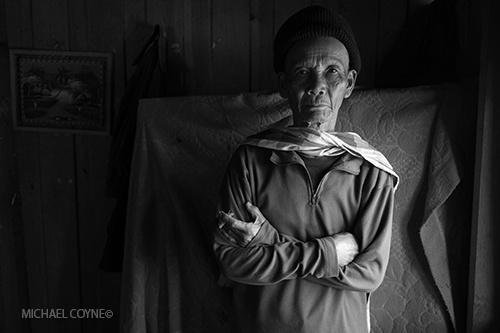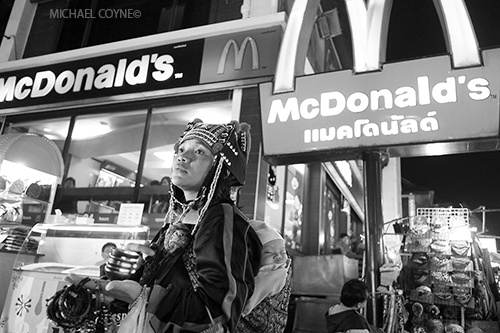Michael Coyne, a Senior Fellow at PSC, has been sharing his experiences while on assignment in South East Asia.
The wailing voice rose to a high pitch then dropped into a low groan. I located the entrance to the building from which the sound was emanating.
Crash, bang. The cymbal and bells in the hands of a hooded man set up a syncopated rhythm to accompany his incessant howling. Before him was a makeshift altar illuminated by a single candle. Behind the devotee crouched another man propping him up as he stumbled at the height of his veneration. “Ask them if I could take picture,” I said to my interpreter who was standing in the doorway but wouldn’t come in. “No, no, no”, said the hooded mystic’s crouching supporter. My anxious looking interpreter began backing away, edging up the street. “Come back”, I called. “I need permission to take a picture”. Reluctantly he came back muttering, “I don’t like, don’t want to go in there.” Again we asked for permission to take a photograph. Another man who was carrying a large knife, which was still dripping blood from the pig’s throat he had just slit, waved me in but indicated no pictures.
By now a group of people had gathered behind the still wailing man who seemed to be in a trance. They draped paper decorations around their necks. Facing the altar they paid homage and then threw the paper decorations in a pile. Someone threw a match on the paper mound. It flared, then burnt and was soon just a heap of ash on the floor. Two birds were brought in and their throats were slit. The blood was gathered in the manner of the pig’s blood from the earlier sacrifice. By now my interpreter had totally disappeared so I mimed my request to photograph the event. The response: an unequivocal no.
The people began to drift off, seeming oblivious to the hooded one still apparently in a trance and continuing to howl with extreme fervor. Outside I watched women cooking the sacrificed animals.
I have been travelling through the hills in northern Thailand photographing the Hmong and Karen tribes. What I had witnessed was a Hmong shaman performing an animal sacrifice. A shaman’s job is to bring peace and harmony to families and animal sacrifice is part of this tradition.
I eventually found my interpreter at the far end of the village, gossiping and sucking a sugar stick. He belongs a different tribe from the one involved in the shamanist ritual but, even so, he couldn’t or wouldn’t explain what had frightened him and why he was unable to look at the ceremony.
I don’t know why the Hmong wouldn’t let me take pictures of this event but it’s their right to say no and it’s my choice to respect them.
Karen villager.
Tribal girl with baby.
Check out Michael's previous guest posts:

